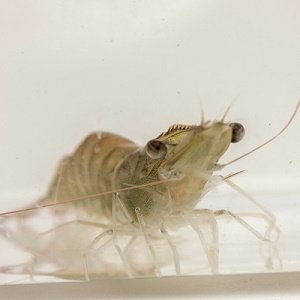by Reidun Lilleholt Kraugerud, Nofima
Researchers have now been able to document that sterile salmon are just as healthy as fertile salmon.
Over a period of several years, Nofima researchers and partners have developed a promising method for sterilising salmon. Sterile farmed salmon are in demand as this can limit the impact of escaped farmed salmon in rivers. The production of sterile salmon will also contribute to improved meat quality, less disease and lower mortality.
In order to further develop the Nofima method into industrial large-scale production of sterile salmon, satisfactory health and growth must also be documented.
At least as healthy
Senior Scientists Øivind Andersen and Helge Tveiten at Nofima have now examined important production traits in their sterile salmon throughout life by in-depth investigations of body growth, smoltification, stress tolerance, salmon lice infestation and mortality at sea.
The sterile salmon show production characteristics that are at least as good as fertile farmed salmon. A severe lice attack showed that sterile salmon are not more susceptible than fertile salmon. The scientists have also documented that the sterile salmon had no reproductive cells from the embryonic stage to the time of slaughter.
Stands out from other methods
The method developed by the scientists blocks a factor that is required for the development of reproductive cells at the embryotic stage, which means that the fish never become sexually mature. Except for the small gonads that do not produce roe or milt, the sterile salmon have the same outward appearance and characteristics as fertile fish.
There are several ways to sterilise salmon, such as triploidization and gene editing. However, triploid salmon have been rejected as an option in Norway due to welfare issues and the use of gene modified salmon in production is still not permitted.
Andersen and Tveiten have now started working on different strategies for large-scale production of sterile salmon in partnership with the fish farming industry. The research is financed by the Norwegian Seafood Research Fund (FHF) and is in cooperation with Aqua Gen and AquaPharma.
Stay Always Informed
Join our communities to instantly receive the most important news, reports, and analysis from the aquaculture industry.
Contact person
Øivind Andersen
Senior Scientist
+47 64 97 03 92
oivind.andersen@nofima.no
Editor at the digital magazine AquaHoy. He holds a degree in Aquaculture Biology from the National University of Santa (UNS) and a Master’s degree in Science and Innovation Management from the Polytechnic University of Valencia, with postgraduate diplomas in Business Innovation and Innovation Management. He possesses extensive experience in the aquaculture and fisheries sector, having led the Fisheries Innovation Unit of the National Program for Innovation in Fisheries and Aquaculture (PNIPA). He has served as a senior consultant in technology watch, an innovation project formulator and advisor, and a lecturer at UNS. He is a member of the Peruvian College of Biologists and was recognized by the World Aquaculture Society (WAS) in 2016 for his contribution to aquaculture.







